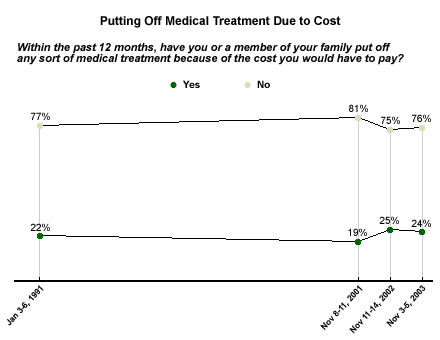Managed care is based on the presumption that preventive care and early diagnosis and treatment may improve health outcomes and control healthcare costs. Although roughly 90% of Americans reported in a November Gallup Poll* that they are covered by some type of insurance, about a quarter (24%) of Americans in that same poll said that they or a family member put off medical treatment in the last 12 months because of costs. If the premise of managed healthcare holds true, then putting off medical treatment either represents consistently poor decision-making on the part of healthcare consumers, or else the system isn't promoting the type of behavior it was intended to.
Putting Off Medical Treatment Because of Costs
The percentage of adults reporting that they or a family member put off medical treatment because of cost has remained relatively stable since Gallup first asked the question in 1991.

However, there are warning signs that this percentage could increase. A survey by Mercer Human Resources Consulting found that healthcare insurance premiums increased 10.1% in 2003. That means more employers will be on the lookout for less expensive plans with higher deductibles and higher out-of-pocket expenses for employees. The American Medical Association reports that a third of HMOs raised copays for physician office visits in 2003. The average copay was $15, but for one in three HMOs, copays were $20 or more. The Center for Health Systems Change reports that with a $2,500 deductible, 22% of chronically ill Americans, 53% of those in poor health, and 66% of those who are hospitalized would be forced to spend 10% or more of their income on out-of-pocket expenses.
What Types of Treatment Are Being Put Off?
Those who said they had deferred treatment for a condition or illness were most likely to characterize it as "not very serious" (44%) or "somewhat serious" (42%). This makes sense, but it nonetheless runs counter to the managed care concept -- putting off medical treatment when a health condition is in its mild early stages may lead to more serious and costly health problems down the road. Early diagnosis and treatment of medical problems is more cost-effective in the long term and leads to better health outcomes. Delaying treatment for less serious health conditions may be penny-wise, but it is also pound-foolish.
Emergency department overcrowding may also be aggravating the situation. Many facilities are implementing strategies to keep non-urgent cases out of the ED, including triaging patients who classify their conditions as non-urgent. Low-income patients, who often cannot afford routine preventive healthcare, are the most likely to visit emergency rooms. If these patients are excluded from the emergency department for non-urgent conditions, will they seek care elsewhere (at a doctor's office), or will they decide to postpone it? Choosing the latter option could once again prove to be pound-foolish.
Bottom Line
Politicians will continue to debate about healthcare during this election year. The Democratic candidates have not overlooked the impact of healthcare costs on access to care. In a Jan. 6 debate, presidential hopeful John Kerry attacked Howard Dean's and Dick Gephardt's arguments that the Bush administration's tax cuts should be repealed, saying this would hurt middle-class families encountering increased healthcare costs. Considering the fact that 31% of people in households earning less than $50,000 per year report putting off medical treatment because of cost, this concern appears to be valid.
*Results are based on telephone interviews with 1,007 national adults, aged 18 and older, conducted Nov. 3-5, 2003. For results based on the total sample of national adults, one can say with 95% confidence that the margin of sampling error is ±3 percentage points.
For results based on the sample of 226 adults who have put off medical treatment due to cost within the past 12 months, the maximum margin of sampling error is ±7 percentage points.